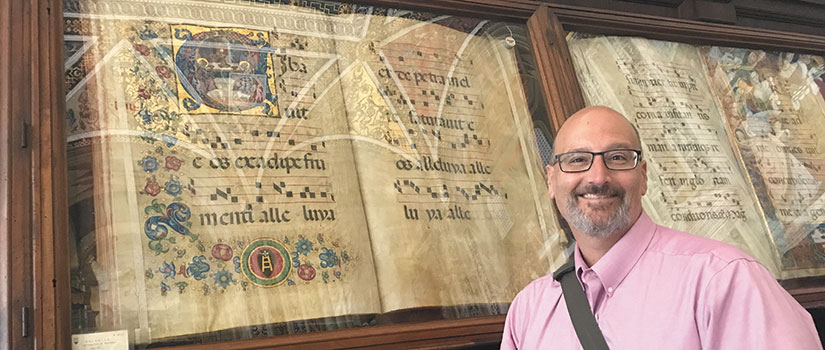Posted February 1, 2018
By Rachel Pittman, junior journalism major, reprinted from InterCom
Top photos by Anna Maria Lankes
For those in the School of Library and Information Science at USC, libraries are not buildings with books — they're communities with the power to connect the world.
“All around the country and all around the world you have different library organizations, and these organizations are made of people," said Dr. David Lankes, director of SLIS. The idea is to identify these people — the key innovators in these fields — and tie them together into what we’re calling the Knowledge School.”
The Knowledge School is an international resource network for those in library and information science. Developed by Lankes soon after he became director in 2016, the goal is to make it easier to share ideas and information, as well as develop personal relationships and mentorships, curricula, virtual lectures and other educational materials.
The concept came about as a response to the changing nature of both libraries and the processes of distributing information. In the digital age, libraries are less static institutions that house books, and more living, breathing cores of different peoples and areas.
Libraries around the world are changing, and we really believe that SLIS could be instrumental in making that happen, so we are doing that through reaching out internationally and connecting people.
- David Lankes
“Libraries around the world are changing, and we really believe that SLIS could be
instrumental in making that happen, so
we are doing that through reaching out internationally and connecting people,” Dr.
Lankes said. “How do we make people look at libraries less as places that are concerned
only with paper and books and materials and more as community centers?”
While Dr. Lankes and other SLIS faculty have traveled to far-off locations such as Florence, Italy and Warsaw, Poland, to build relationships with libraries and library science experts, technology allows the Knowledge School to function across national and international borders without requiring those at SLIS to apply for a passport or board a flight.
Through the Knowledge School’s digital network, SLIS students in Columbia classrooms can hear lectures from international librarians and experts and learn of new ideas and developments in libraries around the globe.
“Most library services and resources are not bound by geographical location,” said Dr. Dick Kawooya, an assistant professor at SLIS also at work on the Knowledge School idea. “Likewise, the problems and needs of communities served by libraries the world over are not always unique to those communities. Hence the need for a global approach to library services and networking.” According to Kawooya, SLIS is doing this by giving students and faculty a global learning, teaching and research experience to enable them to widen the geographical scope of the problems and questions they work on.
The Knowledge School opens new doors (figuratively and literally) for SLIS faculty, staff, students and alumni by unlocking a limitless web of influencers and information for Carolina. Mentors and new curriculum materials are available to the school through the concept, multiplying the opportunities that SLIS can offer to its past, current and future students. Those behind the idea are even planning an event for the spring of 2019 that would bring those involved in the Knowledge School to South Carolina, essentially delivering the world to Carolina’s doorstep.
However, the Knowledge School is being formed not only to bring the world to South Carolina, but also to share South Carolina with the world. With programs such as Cocky’s Reading Express, SLIS has created a name for itself in the state, becoming a part of local and regional information communities and literacy initiatives. According to Lankes, it’s time to take that influence to an international level.
“This school has a track record of doing amazing things, and it’s had a great impact here in South Carolina,” Dr. Lankes said. “We want to take what we’ve learned here, connect with experts and innovators around the world, bring them together, and decide how we can increase that impact.”
